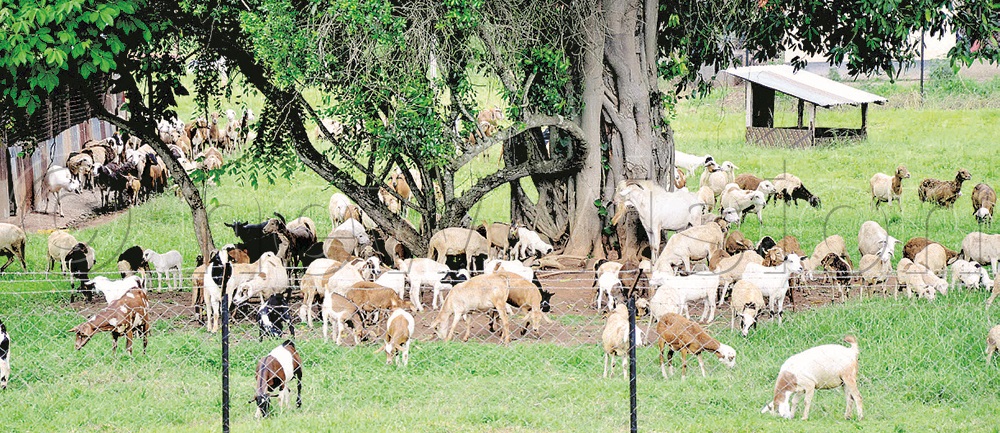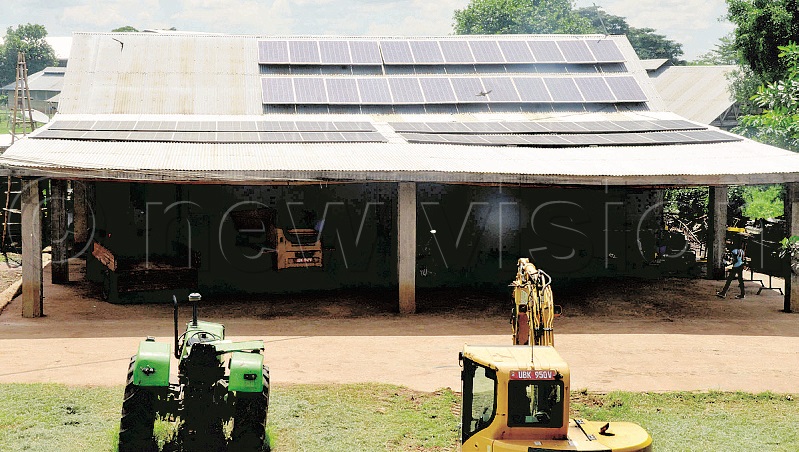By Herbert Musoke
“When you give your farm what it needs, it will give you what you want.”
That is a simple principle to a profitable farming business. Welcome to Farm Up, where farming is a business. These are the welcoming remarks from Dr Daniel Masaba, the director of Farm Up, a poultry breeder in Kalagala, Nakaseke district.
His farm sits on 450 acres with over 10,000 breeder chicken for layers, a hatchery, broilers, goats and sheep. There are also 200 acres of maize.
Genesis
In 2019, Masaba, a medical doctor working at Marie Stopes in Tororo, wanted to set up a venture that would enable him generate a side income.
“Since I grew up seeing my parents engaging in agriculture on a small scale, I zeroed in on greenhouse farming. I visited a company trading in greenhouses to learn the basics. I also booked a greenhouse. However, before I completed making the payments for it, I was introduced to poultry farming by a farmer I met,” he says.

Dr Masaba changed his mind from greenhouse farming to poultry with 800-layer chicken on his father’s land in Mbale and has never looked back.
“I visited progressive poultry farms to pick lessons, but many turned down my requests. However, a few gave me an audience and I learnt from what they were doing; the right and the wrong,” he says.
After that, Masaba opted to pick more lessons on YouTube and Internet from which he downloaded books about best poultry rearing practices, which guided him on how to manage a profitable poultry farm. Using this information, his 800 chickens performed so well that he continued growing to 2,000 chickens from 2019 to 2021.
His income increased and saved part of the returns to buy three acres of land just a few metres away from his father in Mbale. The enterprise has been growing and in 2021, he quit his job to concentrate on the farm.

“I have since realised that there is no job that can pay as much as farming since your income increases according to the effort, time and innovation one invests,” he says.
Knowledge and innovation
Masaba explains that by the time his first stock became offlayers, he had learnt that there is a lot poultry farmers don’t know, which has limited their incomes since their birds can’t lay to their full capacity.
“I decided to start up a YouTube channel on which I share experiences with fellow farmers extensively to help them make informed decisions,” Masaba says.
Venturing into breeder chicken
Dr Masaba now breeds chicks with 10,000 breeders for both layers and broilers, which produce 100,000 day-old chicks every week.
“Venturing into breeder chicken, came as a result of the stock out I suffered. I would book for day-old chicks and it would take six months before I acquired them. As I was still contemplating what to do, I was approached by a friend who wanted to venture into farming, but did not know what to do,” he recalls.

His friend interested him in breeder stock to produce quality day-old-chicks to address the stock out challenge which was affecting the whole poultry sector.
From his savings, Masaba bought 100 acres at Kalagala-Nakaseke where he has set up a Farm Up breeder poultry farm.
Currently, it sits on 450 acres as he has gone on buying more land from the incomes and savings since 2021. The breeder farm started in 2021 with 3,000 birds.
“We get our breeder stock from the Netherlands, a renowned high quality day-old chick producer, each costing $8 (sh30,000),” he says.
The profitable practices
Masaba explains that a number of people have lost money when they ventured into business without knowing the right things to do to maximise profits. Most people just invest because they saw someone else doing it.
“Poultry farming has one major principle; give me what I want, I will give you what you want. As farmers, we want meat from the broilers and eggs from the layers. However, for the birds to give you that, you must give them what their bodies require for maximum productivity,” he explains.
Masaba adds that to get the best production, he gives his chicken mixed feed with all the necessary nutrients in the exact measurements with clean water.
He adds that they don’t tamper with the quality or the amount of feeds for chicks, because that would cause a change in production and income.
“The chicken we breed has the potential to lay up to 95%, but a farmer must be consistent with good quality to achieve this. If the amount of feed for the chicken is decreased and laying reduced by 2%, a farmer with 2,000 layers will have lost 40 eggs per day, which is an equivalent of 1,200 eggs a month giving you 40 trays. If each tray is sold at sh10,000, it means a farmer will lose sh400,000 each month,” he explained.
Feeding
When they are chicks (below three-months) Masaba feeds them on Koudijs pellets, which he says boosts their growth. After that, he mixes his own feeds using local ingredients, such as maize and premix, depending on his own formulas.
He explains that their feed is always kept stores to ensure it is safe and clean. Also, we serve our birds with clean quality feed and clean water all the time.
“To ensure this, we designed a house, which minimizes human contact with the birds as everything is done automatically from supplying feeds to water flowing through pipes. The laying nests are also made in a way that workers pick them from outside the chicken house,” Masaba says.
He says apart from ensuring availability of feeds and water for the birds, it minimises human-to-bird contact, which reduces the risk of contamination and infections.
Goats and sheep
The farm, Dr Masaba says, has 300 sheep and goats. After acquiring his own land, he desired to diversify into livestock rearing and bought cows, sheep and goats.
“After switching to breeder chicken, we are slowly phasing out the other livestock. However, we are still getting money as we sell over 100 sheep and goats a year, each going for about sh250,000,” he says.
Farm security
According to Masaba, ensuring security requires a multi-pronged approach. There should be multiple lines, that if one fails, then you will be guarded by the other.
At Farm Up, the first line is fencing, where the 450 acres are fenced with wire mesh.
In addition, it is partitioned according to enterprise and each has a gate, which must be kept locked to stop unauthorised persons or outside animals from entering.
“Breeder birds are not only expensive, but also sensitive. Therefore, there is much need to limit movements and contact of animals and humans with the farm and outside the farm. This can only be done by fences and gates,” he stressed.
The other aspect is bio[1]security. Right at the first gate, where each visitor must register including him (the director), there is a tyre wash trough, where the vehicle passes and a footbath for the people.
“If we have any failures, we always use sprayers for the vehicles and people. We, however, receive very few visitors as only those who must visit us, like policy makers, are allowed. This is to limit as much contamination from humans as possible,” Masaba added. A
lso, to ensure safety of the birds, all chicken houses have bathrooms, where whoever is to enter must take a bath, inclusive of the workers and wear overalls that are not allowed to leave the chicken house.
Workers from different departments do not mix at farm nor go outside the farm until they get official leave.
There are cameras installed at every corner of the farm and connected to Dr Masaba’s phone, where he can monitor and see whatever is going on around the farm at any time, in addition to the security guards and well-trained dogs.
Technologies and innovations
The farm has a workshop, where innovations are made for repairing tractors, but also, maintenance of machines and technological appliances, forage choppers, lawn mowers and solar equipment.
“To ensure innovations at the farm and reduce expenditures, we make many of the inputs ourselves, such as concrete poles for fencing, welding all the gates and the doors, among others, using solar,” he says.
The human resource
The farm has over 80 permanent employees. In addition, there are also casual workers, who are hired whenever there is a need, for example, during planting, harvesting and building.
All the permanent workers live on the farm to avoid contact with other people, which could cause diseases.
Hatchery
Masaba explains that when they went for breeding chicken, they established a hatchery and now produce 100,000 day-old chicks per a week, for both layers and broilers.
“Because we need to minimise human proximity with breeder birds, we established the commercial layer farm away from the breeder one in Mbale Although we reared both layers and broilers here as we were testing the quality of our birds, after realising they are of best quality on the market, we separated the two, since for the commercial birds, there is constant interaction with the outside market while selling eggs,” he says.
The chicks are sold at sh2,800 each for the broilers and sh4,500 for the layers, but one must book because the demand is high, Masaba adds.
Family participation
Masaba says his family is fully involved in the running of this farm.
“It is important for a family to be in the business, but also risky putting them in a position they don’t have capacity to handle or and where they don’t have interest,” he says.
Therefore, whoever is on this farm is working where their capabilities are needed, for example, his wife is in the accounts department because it’s her profession and others in sales.
He adds that those in big positions start small as they go on graduating to bigger responsibilities.
Achievements
Masaba says he has achieved a few things, such as buying land for production and also built a home. “I have managed to buy a car. Above all, I have seen my farm expand and grow,” he says.
Community engagement
The first benefit to the community is employment, since all the work is done by community people around. Also, the farm shares with the community, especially during big days, such as Easter, Christmas and Eid, by giving them meat, eggs.
“Apart from the local community, Farm Up has greatly impacted the poultry farming community, as it has become a learning platform where farmers get practical experience and information they can use to change their poultry farm management and increase their productivity and profitability,” he adds.
Challenges
The fluctuating feed prices have continued to challenge Farm Up, as grain prices increase up to sh2,000 a kilogramme, which affects the profit margins of the project.
“Because we have many birds, we have to buy from open market to supplement on our harvest,” he says.
Markets, especially for the eggs, is also a challenge, as there are times when the price is lower than feed prices, which makes the business impracticable.
The market strategy
Much of his market is from the Internet and social media, especially Farm Up YouTube and Facebook, where he posts all the farm products to get customers.
“We also use mainstream media, especially Vision Group, where we place adverts in the papers, especially for the day-old chicks. This has given us overwhelming feedback. Others have come by referrals from other customers, but also, interpersonal interactions with farmers as we keep monitoring and advising our customers, even when they have not stocked from us,” he says.
Plans
The main plan is to expand this farm to produce more day-old chicks so that we established a commercial poultry farm for broilers.
This is they don’t stop at producing chicks, but move throughout the value chain and produce dressed chicken ready for consumption.
“We want to make this farm a one-stop centre in the poultry business, where everything about poultry can be found. Our biggest dream is to become International where Farm Up is known all over the world,” explains Dr Masaba.
Farm management systems
Dr Masaba explains that it is important to have management systems in place so that your farm survival doesn’t depend on you as it is possible for the farm to die with you in case of any problem.
“Every worker is assigned a particular task that must be done following our stipulated protocols. For example, in the case of picking eggs, the worker responsible for that knows how, when, where and why. Therefore, if at any one-time eggs are found in a wrong place, it simply implies they were being stolen and he/she must explain,” he says.
Masaba explains that this eases implementation and monitoring of the management process. It also ensures that things are done the right way following the laid procedures.
What others say
Martin Waiswa, farmer
I always look up to Dr Masaba. He is my motivation. Indeed, farming is great if you have the best teachers around you.
Olive Precious, farmer
Farm Up is my role model. I love what they are doing and the training they offer to share knowledge and skills for the young people who wish to learn and venture into poultry as a business.
Flavia Mirembe, farmer
I have learnt a lot from Farm Up, which has helped me change the way I manage my farm from feeding, to bio-security, among others, and I am seeing more production and profits.





